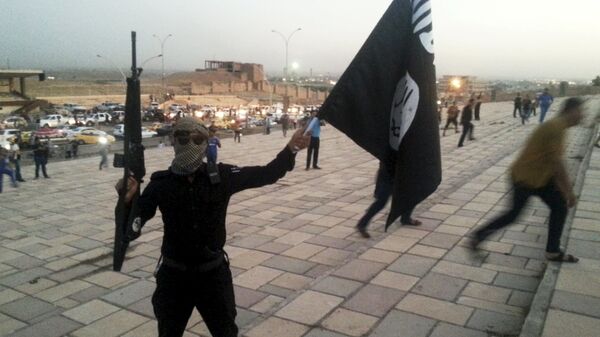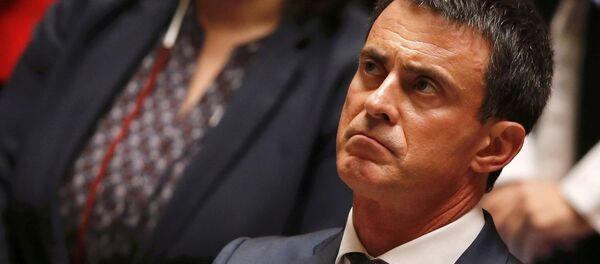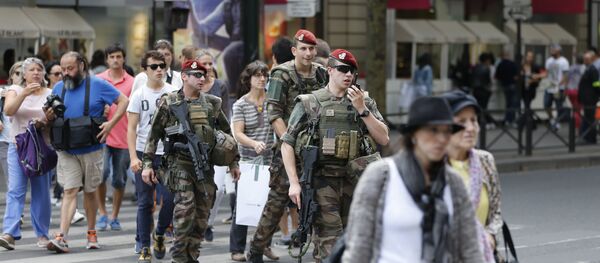A recent spate of terror attacks in Europe by followers of the terrorist group Daesh (ISIS/Islamic State) are likely to be followed by more "copycat" attacks, Colonel Richard Kemp, former chair of the UK government's Cobra crisis response group, told Radio Sputnik.
On Tuesday France was shocked by the brutal murder of an elderly Catholic priest in Normandy by two French 19-year-olds, Abdel Malik Petitjean and Adel Kermiche, during a church service.
Kemp said that such attacks are new in the West, but "the Islamic State makes a habit of doing this in the Middle East and other countries in Asia."
"We shouldn't think that this is now the new form of Islamic State attack, the reality is that they will continue to attack a range of different targets, and probably in the future this type of target because it does gain them what they want, which is both butchery and public attention."
Kemp said that France and other Western countries are too liberal in their handling of individuals who are known to be a threat to public safety.
"On the whole, Western European countries are too lenient with people who are known to be either terrorist supporters, or previously involved in terrorism," Kemp said.
"Obviously the tag didn't work. It's easy to blame the French security services, but they're operating under considerable constraints. One of which is that resources simply do not allow you to monitor individuals round-the-clock and to predict exactly what they're going to be able to do and stop it."
"Secondly, there is lack of political will to act with sufficient vigour and force against people who display jihadist tendencies we need to crack down on (them) and adopt a zero-tolerance approach," Kemp said.
Kemp said that as well as imprisoning and deporting terrorists, the West must tackle the source of Islamic terrorism in the Middle East.
"More decisively, this wave of attacks comes from the inspiration provided by the success of the Islamic State in the Middle East. Yes, the Islamic State (terrorists) have suffered some setbacks, but over all they have been seen to have confronted the US and its allies, and not to have been defeated, and in some respects (seem) to be winning so far," Kemp said.
"That is inspirational for people who follow the Islamic State, and therefore the way to stop it is to crush them, they should be annihilated, we could have annihilated them by now through brutal military force against them in the Middle East."
On July 14 in Nice, Bastille Day, Tunisian-born Mohamed Lahouaiej-Bouhlel drove a cargo truck into crowds at the seafront, killing 84 people.
Following that attack, Interior Minister Bernard Cazeneuve responded to criticism of the government's security measures, and promised an inquiry into the security arrangements in Nice during the Bastille Day celebration.
On Thursday, French President Francois Hollande announced the recreation of the French National Guard, and organization that was founded at the time of the French Revolution and disbanded following the fall of the Paris Commune, from existing reserve forces to better protect citizens facing terror attacks. Hollande, together with Cazeneuve, called on "all willing French patriots" to sign up as reservists.
"It's part of the answer, the stronger and more robust protective security you have, the more protection you provide to innocent civilians trying to go about their business."
Dr. Didier Leroy, a leading terrorism researcher at the Royal Military Academy of Belgium and an adjunct at the Free University of Brussels, said that the attacks in Normandy and Nice are actually proof that anti-terror security measures are working to prevent many more terror attacks.
"Leading an attack in France has become more and more difficult, so the assailants are resorting to less monitored tools. Renting a lorry is not illegal, walking around with a knife is not illegal, so by doing so you make your attackers very difficult to attack and be detected," he pointed out.
Leroy agreed with Kemp that French police are "overwhelmed by the amount of individuals they are supposed to be monitoring 24/7."
There are 20,000 names on France's S (state security) anti-terror list, 10,500 of whom are suspected jihadists.
France provides the biggest EU contingent of Daesh fighters in Iraq and Syria, while Belgium has had the largest number of Daesh recruits per capita. Leroy said that many of these Daesh terrorists have connections to Islamic terrorism in North Africa.
"If you track the police investigations about different criminals associated with recent terrorist attacks and attempted attacks, you can clearly discern a pattern, like a genealogy linking the current individuals fighting for Daesh with former terrorists linked to the Armed Islamic Group of Algeria back in the 1980s, for example."




